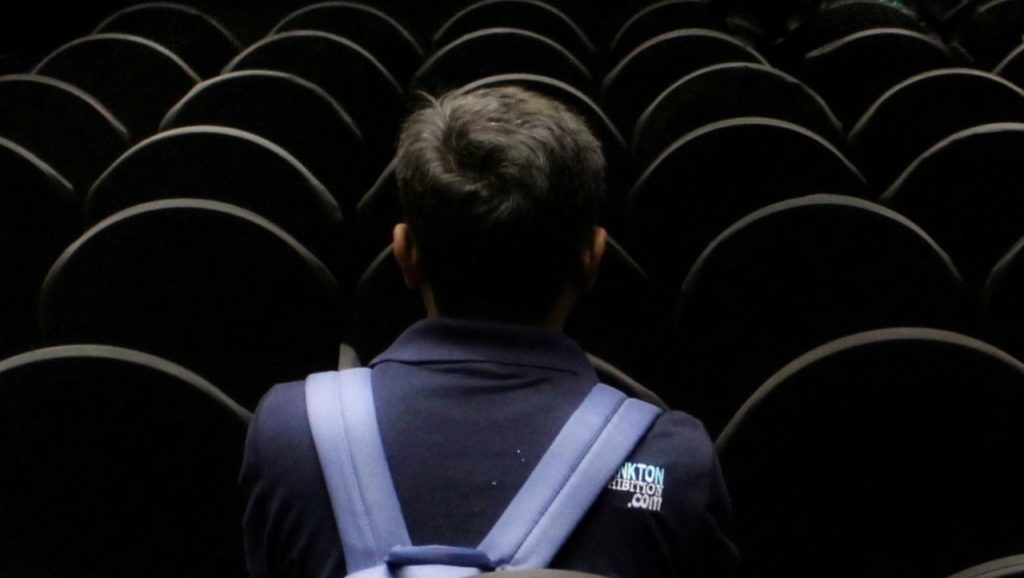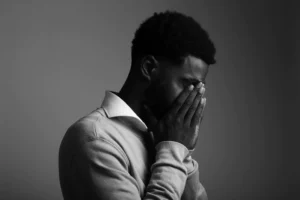March 2020
Author’s note: Since I usually write fiction for Boundless, I should point out that this personal essay is essentially a true story. However, names and details have been changed to protect the identities of individuals and tighten the chronology.
I’m walking down a wide empty hallway, except that I’m not walking at all: I’m floating a few feet off the ground. Somehow, I’ve become lighter than air.
I’m surprisingly unsurprised that I’m weightless—that feels natural. What amazes me is how effortlessly I glide through the air. Whenever I drift downward, pumping my legs bicycle-style is all it takes to gain altitude.
I come to a stairway that I don’t have to climb, wafting uphill like a ghost or an angel. Still aloft, I arrive at a doorway . . . and that’s when sound shatters stillness.
I hit snooze on my alarm because the flying dream doesn’t come often. When it does, it’s a gift of wonder I hate to lose . . . but it’s gone.
I wish I could remember more of the dream. Floating down the hallway always seems so real, maybe more real than peeling back the covers, especially when anxiety comes crashing into my brain:
What’s with this coronavirus thing that’s cancelling events everywhere?
I shrug off thoughts of faraway problems and head to the kitchen for breakfast, then hit the front door for a morning walk. My goal is 10,000 steps, which means an hourlong circuit of the neighborhood. It would be nice to float weightlessly down the street like in my dream, but it wouldn’t be good exercise. Besides, the neighbors would stare.
I walk past the local meatpacking plant (read: slaughterhouse) and try not to breathe the ever-present smells while I watch an army of hair-netted workers head into the early shift. Then I pray — not arrogantly, I hope, but gratefully — thanking God that I have a creative job and asking a blessing on the workers about to spend eight hours chopping pig carcasses into pork chops.
Post-walk, I dig into the daily grind . . . except that my work isn’t very grinding. I founded an educational theatre company 13 years ago, so I’m my own boss and work from home. Our little company provides drama clubs for kids and performs professional plays in schools.
It took a long time to build this organization. For the first few years, there were months when I didn’t know how we’d pay the rent. More recently, there have been days when I wanted to change careers to something else, anything else, because of the stress. But I’ve kept at it — not because I’m a creative genius, but because I’m too stubborn to know when to quit.
As I settle into the workday, my computer delivers more grim news about COVID-19: It looks like schools might close for a few weeks. Still, I try not to worry. The United States has unlimited medical resources; I’m 42 and healthy. Things will be back to normal soon enough.
Our drama club performances will probably get delayed, I grouse mentally. The teachers’ strike was last spring; this year, we have COVID. It’s a pain, but it’s not the end of the world.
June 2020
It’s been three years since the end of the world, or that’s what it feels like, except it’s only been three months, and every day since mid-March has been burdened with anxiety or depression or both. It’s getting harder and harder to get up at 6 a.m. for breakfast and a walk, largely because it’s harder and harder to find things to do afterward as my busy theatre company dwindles to nothing.
I’m not nearly as scared of getting sick as I am of going broke. My whole business evaporated when schools shut down. Actually, it feels like life has evaporated. I’ve spent three months walking in circles, attempting various exercises in futility.
I realized by late March that in-person school assemblies were toast. “But we can make it through financially,” I told my brother on the phone, “if, instead of cancelling, half the schools on my calendar will switch to virtual performances.”
Unfortunately, not a single school made the switch. Teachers were too busy figuring out how to teach math on Zoom.
In April, celebrating Easter felt as useless as scheduling online performances. Rejoicing in a bodily resurrection was strange in virtual worship, and even stranger because “life” since March had been more like “living death.” Yeah, Christians hope for Paradise, I thought glumly, but heaven for me may be forty years away, and I don’t see much to look forward to in the meantime.
In the theatre world, I wanted to do something for our drama club students who were still rehearsing (but not ready to perform) when the apocalypse arrived. I asked the kids to record lines for a radio play at home, then spent a ridiculous amount of time editing dialogue. The project kept me busy all month . . . and produced zero revenue.
By May, I couldn’t keep desperation out of my voice as I discussed last-ditch attempts to save the theatre company. “I guess I have to plan for summer camps,” I told my wife, Julie. “They’re probably dead on arrival, but what can I do except hope for the best?”
Nothing, as it turns out. Nothing at all. After months of online school, kids sensibly decided that virtual camps sounded like as much fun as dental surgery.
Now, as June rolls around, I try to thank God that I’ve been able to get unemployment checks, and that Julie has kept her job — she teaches the children of essential workers at a preschool. But my thanksgivings are getting threadbare, and it’s time to acknowledge some hard truths.
First, my unemployment benefits are going to run out soon, and the theatre company’s bringing in 10 percent of its normal revenue. That won’t pay the rent.
Second, even if schools don’t stay online this fall, no principal’s going to run extracurriculars like drama clubs. And school assemblies, where you pack 400 kids onto the gym bleachers? Don’t make me laugh.
That leads me to acknowledge the unthinkable, the thing that I’ve refused to contemplate even in the depths of my theatre company’s driest dry spells for 13 years. “It’s time to find a day job,” I admit through gritted teeth.
Julie and I can’t have kids, so this theatre company is the closest thing I have to offspring. When it dawns on me that my baby is dead, I go on a three-day crying jag. I failed, I tell myself harshly. If I’d tried a little longer, worked a little harder, been a little more talented . . . maybe my lifelong dream wouldn’t be roadkill.
October 2020
“I’m very sorry about your husband,” I say gently.
“Thank you,” murmurs Mrs. Graham across the table. She looks to be in her mid-60s like my folks — far too young to grieve a spouse.
“I understand you need to make his final arrangements?”
Mrs. Graham nods. Her daughter adds, “We’d like Dad’s coffin to be wood . . . I know it’s probably more expensive than metal, but he loved trees.”
If you’d told me in March I’d be selling coffins this fall, I would have laughed. Yet here I am, because a funeral home was hiring and I was desperate. I guess it’s macabrely appropriate to mourn my dream while working among the dead.
Still, I’m trying to stay positive about the job. This can be a ministry opportunity, I tell myself. Meeting with Mrs. Graham and her daughters was a good way to spend a day. Definitely not an easy way, but every grieving family should have someone to sympathize and help.
The problem is that grieving people aren’t always teary and grateful — sometimes, they’re imperious and demanding. Grief turns to anger, and they take it out on whoever’s nearby.
I’m thinking of the lady who tongue-lashed me on the phone for 20 minutes, telling me I was just after her money because (strangely enough) funeral homes don’t work for free. Then there was the man who walked out after I spent hours helping him because I was too slow typing up a contract.
Selling funerals takes all my least favorite things about running a theatre company, from repetitive paperwork to difficult people, and packages them in one convenient bundle. I’m a round peg, and this gig isn’t a square hole, it’s some weird trapezoid. As for my creative skills, the ones I’ve spent a lifetime cultivating? Well . . . what about them?
According to customer complaints that my boss James passes along, I’m “pushy,” “harsh” and “unhelpful.” I’ve never heard those adjectives applied to me before, but the criticism still stings for a thin-skinned creative like me. Plus, whenever someone complains, it seems like James takes the customer’s side. It makes me worry about job security.
All that would make me hate Mondays, except for one thing: The weekend is worse. It’s two whole days when I have nothing to do but ruminate on a dead dream and an empty life.
Do customers complain about the other salespeople at work? I wonder. Am I going to get fired? With my theatre company gone, this job’s about all the purpose I have. If I get canned, I’ll have no way to make a difference in the world. In fact, I’ll have no reason to get up in the morning.
Maybe I’m unemployable after running my own business for too long. Maybe we won’t be able to afford rent when the funeral home kicks me to the curb. Maybe bill collectors will start calling. Maybe I’ll never get a creative job again. Maybe it doesn’t matter since we all die in the end.
After a weekend like that, Monday is a relief. I can’t wallow in existential dread and drown in paperwork at the same time.
February 2021
Ever since summer, I’ve been working two jobs: selling funerals and keeping a theatre company on life support. Only the first gig pays enough to keep the lights on, but it’s the second one keeping my soul alive.
The problem is that my sanity’s hanging by a thread after months of working 40 hours at the funeral home, then spending evenings and weekends on the theatre company. Ironically, the stress is getting worse because business is picking up: I have four virtual performances and two online drama clubs scheduled! That’s an embarrassment of riches in the age of COVID.
But the most stressful thing of all is a growing personality conflict with James at the funeral home. I could swear he has perfect recall of every mistake I’ve ever made. Plus, he’s said a couple times that I need to be a better “team player.” But when I asked what I should do differently, he replied, “You’ve been here six months. I shouldn’t have to tell you what your job is.”
James isn’t evil; he’s actually a nice guy. I’m sure everything looks different through his eyeballs. He probably thinks I’m ridiculously sensitive to criticism and a very slow learner. But I’m still terrified of getting fired. My favorite days at work are the ones when he’s absent, and I’ll bet the feeling is mutual.
Finally, after getting two major critiques from James in one week, I spend an entire weekend worried about the ax falling. Julie finally says, “Why don’t you just quit? We have savings, and you’re miserable.”
“But this job has been God’s provision for us,” I protest. “I don’t want to throw it back in His face.”
“It has been God’s provision for us,” she says. “That doesn’t mean it always will be.”
“But what if God still has something to teach me from this job? What if there’s more people like the Grahams who I need to help? What if I can’t find other work?”
“What if this is dragging down your mental health when you’re already struggling?”
“Anyway . . . I’m not sure I deserve to leave,” I mutter, shamefaced. “I mean, I had a theatre company . . .” I throw up my hands. “It failed.”
“It did what?” she scoffs. “A virus shut down the world and you’re still keeping the dream alive. How’s that a failure?”
“Never mind, I just . . . I can’t leave the funeral home because I’m not a quitter!”
Julie gives me a look, but lets it go.
I go back to my regularly scheduled program of worrying. It isn’t until later that I have an epiphany: The question isn’t whether I’m a quitter, I finally realize. Even Jesus quit carpentry to do the “savior” thing; we’re always saying “no” to one thing to say “yes” to another. The real question is what I’m going to quit.
Will I stop shoehorning myself into a job that’s the wrong shape? Or will I give up the dream — dare I say “calling”? — of running a theatre company?
I nervously pick up my laptop and draft a resignation letter. If I think God can only provide for our finances through a funeral home, I’m pretty sure I shrunk Him. Still, I don’t know if resigning while the theatre company’s still gasping for air is the best choice — steady paychecks and health insurance have been awfully comforting.
I agonize over the right choice, but finally turn in my two weeks’ notice. As I do, it’s like a boulder comes off my soul.
Easter 2021
It’s Easter again, and one year (or is it 10?) after the pandemic began, the chill of depression clings to my soul. The coronavirus clings to the nation, and my theatre company is more hope than reality.
To partly make up for my funeral home income, I’m working as a substitute teacher. Being a professional spitball-dodger isn’t the most fun I’ve ever had, but I’m thrilled to be with kids again instead of dead people. The biggest perk is that I can take a day off whenever I need to work on the theatre company.
However, there’s still a rough road between where I am and where I was last March. The journey through COVID has been like walking in circles, and I wonder if it’s worth it to keep traveling.
Then again, I’m in good company as a traveler: Jesus spent much of His ministry on the road. He tramped around Palestine for 15,000 miles over a lifetime, and mostly, He walked in circles like me. Every time there was a festival like Passover, He’d hike 75 miles in three days from Galilee to Jerusalem before turning around to go back. Why’d I ever become human? Jesus must’ve wondered when His feet hurt.
After the resurrection, He gained a new transportation option: teleportation! In my dreams of flight, I hover a few feet off the ground like a ghost or an angel, dodging blisters and stair-climbing alike. But Jesus could do one better when He disappeared or reappeared at will.
Still, His new mode of travel didn’t stop Jesus from taking one more journey on foot. Luke narrates the time, a few days after the first Easter, when Christ joined two disciples along the seven-mile road from Jerusalem to Emmaus. He looked different somehow after the tomb, so the disciples didn’t recognize Him as they unloaded their woes.
“This rabbi named Jesus, he was the Messiah,” the disciples said. “Well . . . we thought he was, until he got himself crucified. How’d we get everything wrong? Yeah, there are rumors about an empty tomb, but that’s crazy talk. People don’t survive crucifixions. The Romans are very thorough people.”
Jesus spent the entire hike helping them see the truth behind His roundtrip to the graveyard. Still, the disciples were in the dark about their companion’s identity until they stopped for dinner and saw the scars on Jesus’ hands.[1] I’m taking an educated guess (shared by some Bible commentators) about how the two disciples in Luke 24:13-35 finally recognized Jesus.
Why did Jesus spend two hours walking with the men when He could’ve just beamed in for a chat, Star Trek-style? Why did He sit down to dinner when apparently, He didn’t need to eat post-tomb? Why did He reveal a glorified body through something as depressing as scars?
I can only guess. But I wonder if He joined the disciples’ dejected journey because humans don’t learn much when we hover over the world leading a dreamlike life. We’re transformed by the rutted road, like the way I learned to be gentler with grieving people from Mrs. Graham.
Maybe Jesus joined His followers for dinner because God manifests His glory through mundane gifts like bread and wine. The curse of abundance is that we don’t appreciate the everyday miracles, but let me tell you, I’ve never thanked God so heartily for meals as in quarantine, when there was nothing else worth anticipating.
I suspect Jesus revealed himself through scars because the wounds we suffer along the way, even from cranky bosses and evil customers, makes us deeper, more empathetic souls.
It adds up to a reminder that life with Jesus — resurrected life — isn’t someday, it’s right now. Jesus came proclaiming an everlasting joy that begins in time, and he brings it about through the journey.
I haven’t had my dream about floating down the hallway in months. That’s a shame, because this would be a good time to fall asleep and only wake up when the pandemic is a bad memory. Except, of course, it’s not — even when the journey passes through the valley of the shadow of COVID.
I’m waiting to return to a dreamier life. Perhaps this summer will be filled with drama camps and eager students and time to create. But for now, the road is a part of the dream, even if it loops in one big circle, because it’s the way Jesus is inaugurating the next chapter in my resurrection life. He’s not awakening the person I was — He’s quickening the soul He created me to be.
Copyright 2021 George Halitzka. All rights reserved.












